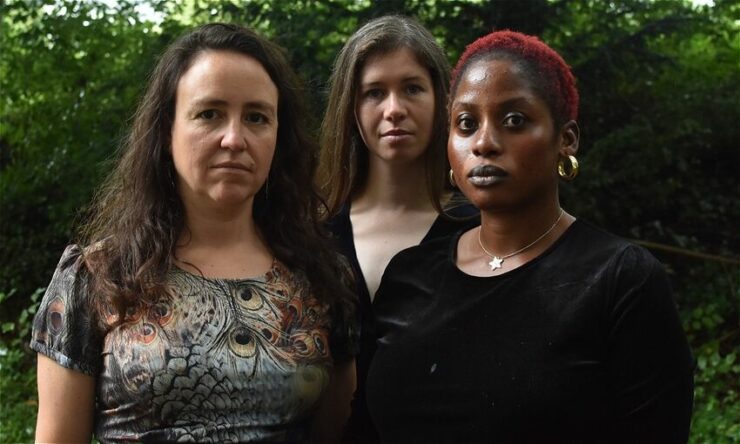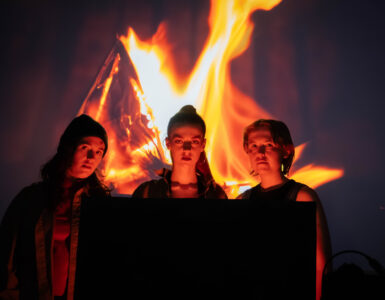Threads of destiny and deliberation twine together in the thoughtful, contemplative, and above all compassionate storytelling piece Stories of the Fates. Wandering Stories is a collective of voices that first collaborated at the Amsterdam Storytelling Festival among others, before going on to put together this piece.
Stories of the Fates weaves together the ancient mythos of three Goddesses of Destiny with the modern day realities of being a Queer refugee, the heart-breaking realities of human trafficking and sexual exploitation. This is complimented with a continual thread elaborating who gets to tell the stories of women, and who gets to decide what place they have in our cultural canon.
A trio of storytellers enter carrying a ball of red thread, unwound around the stage as you start to notice small pin pricks in the curtains behind the performers. Throughout, pieces of thread are delicately hung across these as the stories themselves become unwound. Harmonious group singing provides a meditative hum between each story, as we delve between mythical realms of legends and into the personal backstories of the performers on stage.
Sinéad O’Brien takes us through an Irish folktale surrounding the premature death of a young hero foretold by a Goddess, which sets into motion the broader themes of the evening. The three storytellers address the place of women in popular cultures across the world as “deciders of fates”, look to redress those stories by considering who gets to craft that narrative, and contest the forces that forged their own fates and positions in society through lyrical and informal prose.
Jacqueline Korevaar threads in the stories of her family history, bolstered by the myth of a young boy’s traumatic relationship with his father and finding his calling through escaping a world of whispers surrounding his past. Meanwhile, Naomi Namutebi takes the chance to elucidate a bizarre and lucid dream-like folk-tale surrounding a Rabbi and the birth of a horse. This culminates in a decisively raw, emotive, and heart-breaking elucidation of Namutebi’s past as a Queer refugee and how she found her own fate telling her story on stage.
The relationship of the stories to the themes is quite deliberately adjunct – as all good myth-making is – we’re offered a peak into strands of oppressive culture in the home countries of each of the performers, that then becomes reflected, teased out, and cross-examined in the telling of ancient tales. Time exists in a mist of personal and national stories that flow into one another, almost as if one provides the energy for the other. The imprints of cultural and familial identities meshing into a miasma that permeates the air of the performance space.
The informalities of the whole affair invite you into a deeply personal realisation of fate and destiny – without ever losing the fact that this a performance and a presentation. The trio revel in the chance to form myths with word and movement, to articulate a difficult past with a revelatory present. Natural hand movements from presenting a story dip thereafter into the braiding of each other’s hair, while the hum of the melancholic singing guides you from thread to thread with pathos.
O’Brien’s ability to translate Ireland’s national story into tangible emotion and relate it to the real world shines in this piece – asking us not to discard stories of the past but reconsider who gets the chance to tell them and how we can culturally work them into our lives. Korevaar delivers a twisting turn of a narrative in the story of the Swiss boy, able to hold the audience entirely in her palm.
Namutebi takes the final act of the piece with confronting honesty and openness. She essentially bleeds her past onto the stage in a manner that looks to seal the broader themes of the piece through traumatic real-world experience. Her demeanour is effervescent yet able to deliver the gravity of the difficult and personal themes highlighted, and her final story truly ties the piece together.
The links between the stories can sometimes come across as obscure, which may be one of the more alienating effects of the piece – yet this is the way that legends are created, and commends are due to the trio for creating something that both abstracts and relates in equal measure. O’Brien comes across as the most polished of the performers, with Korevaar and Namutebi occasionally stumbling over their words, yet the piece manages to keep you in its defined and divine atmosphere throughout.
Weaved with caring hand – stories of womanhood and destiny intertwine with revelatory mythos. Emotive performance carve refined myth-making introspection into who gets to tell their side of the story.
Recommended Drink: Take a cold sip of fresh water into this one, and prepare for a new perspective on classic stories.
Performances of Stories of the Fates have now concluded at Prague Fringe.









